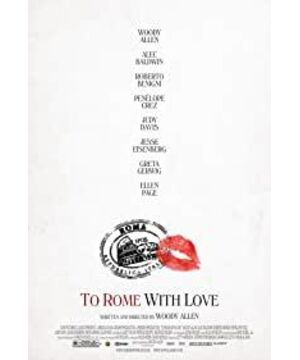The concept of the "narrator" is always prominent in Woody's films. Take his "European Cities" film series as an example, both "Match Point" and "Midnight in Barcelona" feature the narrator as the narrator. At the beginning of "Love in Rome", after habitually showing the city street scene, the traffic police on the streets of Rome appeared, and he witnessed everything that followed, and finally ended with his words. Interestingly, from time to time in the process of watching the film, people feel that the identity of the narrator has more symbolic features this time, and the reason may be the return of Woody Allen himself. Since he "died" in "Scoop", he has never appeared in his own film as a "narrator"; and this resurrection suddenly makes people feel how each protagonist in the film looks Like another Woody Allen, already symbolized by narrative and language.
From the beginning of the plane, Woody Allen's gestures and long-winded never stopped: he was afraid of flying, afraid of death, disliked the future son-in-law of "communists", and could not tolerate the future in-laws who were engaged in funeral work. Understand that his talent is extraordinary but hide his life. Completely different from "Midnight in Paris", Woody used his performance to tell everyone this time that he no longer carefully designed a time-travel story like when he was in Paris, mocking the American middle-class mentality in crisis, and weaving a story that can only belong to A cultural fantasy tour of the romantic nature of Paris - although he still doesn't forget to mock the "drop bag" this time - he just wants to return to the story itself and not some form, even if the story of Paris wins the Oscar for best original screenplay - but this It was nothing, he never went to accept the award anyway.
The four sets of stories in "Love in Rome" seem disjointed and have no similar non-linear narrative connections to each other, like a simmering hodgepodge, but it's mouth-watering, without any strange and annoying taste. Different story coats are like different seasonings, impregnating the same main course: Woody Allen never forgets to express a little anxiety behind the storytelling. Jerry, who had just arrived in Italy, felt very different values. "Retirement means death", and he urged Giancarlo, who made a profession of "putting people into boxes", to "think outside the box" and absurdly put the bathroom on the opera stage. ; Engaged Antonio and Millie swear loyalty to each other but cheat on each other, instead being educated in front of prostitutes and burglary gangsters with "high-end clients" lists; Architect John looks at Anthony Gaudí and Howard • Locke and Monica, who was showing off her same-sex sexual experience, pretended to be a big-tailed wolf, and then used her experience to admonish Jack, who was just like her younger self; Going on TV, sleeping with women, walking the red carpet, and so on, and finally relieved after the ridiculous farce ended. It can be said that all the stories carry a sense of anxiety about love, morality, concepts, etc., and through the packaging of jokes, so as not to dilute the meaning of comedy. However, even in the last seemingly happy moments of his own story, Woody Allen mocked himself by saying, "The idiot who came up with this crazy show should be dragged out and beheaded!" Quite hilarious.
Interestingly, the film's title has changed back and forth, from the rather literary "Bop Decameron," to "Nero La Violin," derived from an Italian proverb, to the finalized "Love Is in the Heart". Rome," the process of "finding" the title, as Woody Allen himself wanders and ponders on his trip to Europe. But we can also exclaim that the final name is doomed: the spelling of the words "Amor" and "Roma" is just reversed. Rome is so sacred and beautiful to the movie, there is the princess Hepburn on vacation, and there is the sweet life under the lens of Fellini. This time, there was more of Woody's laughter.
However, there is a feeling throughout the film that these four sets of stories are not so Roman, with little Italian symbols to speak of outside of opera elements, paparazzi and panoramic shots. This is similar to "Midnight Barcelona" - they don't have any narrative features that must be justified by the temperament of the left bank of Paris, they just happen sometimes in Sagrada Familia, Piazza Venezia, Fountain and Trevi Fountain, and sometimes people can't help but look forward to Gaudí And Picasso's Woody-esque laughter and cursing. Although he told the media that the film was meant to pay tribute to the idol, the great Italian master Fellini, and it seemed that a certain passage implied the shadow of "The Road", at the end of the day, Woody Allen may have never thought of forever like To make a film like "Midnight in Paris", but to retain and return to its own film symbols. And he himself is undoubtedly the most obvious symbol - Woody in "Scoop" is still playing with lame poker magic until his death, and he doesn't even worry about death - this "Love in Rome" The next resurrection, he doesn't really need to worry about anything anymore, he will continue to do his "European scenery drama", mocking others and mocking himself in laughter, and by the way, he may have the opportunity to ignore and despise Oscar again, that's enough. . For us, there is no doubt that we can taste the great meal cooked by Woody every year, and it is undoubtedly very happy - as someone said: Buñuel is gone, at least Woody Allen.
View more about To Rome with Love reviews











